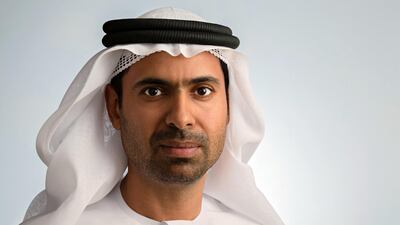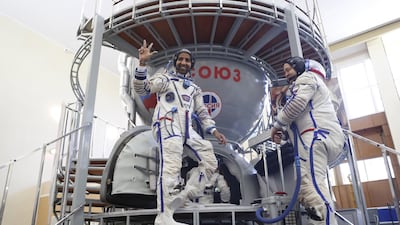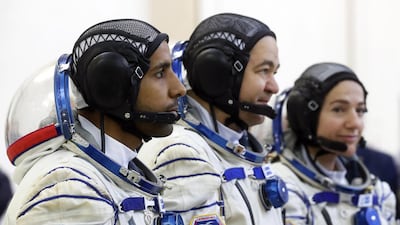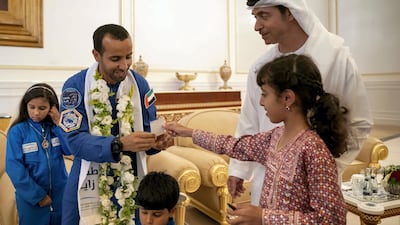Emirati astronauts will receive training at Nasa’s spaceflight training centre in Houston this year as part of a new agreement signed between the UAE and the US space agency.
Maj Hazza Al Mansouri, the first Emirati to fly into space, and reserve astronaut Dr Sultan Al Neyadi, arrived in the States on Monday to begin the programme at Johnson Space Centre.
The news comes four days ahead of the first anniversary of UAE's landmark journey to the International Space Station on September 25 of last year.
"We are pleased to announce the signing of an agreement with Nasa to train UAE astronauts for potential missions to the International Space Station, including space walks and long duration station missions. The programme will train our youth and astronauts for future missions," tweeted Sheikh Mohammed bin Rashid, Vice President and Ruler of Dubai.

The training will take two and a half years to complete and will include the two new astronauts who will join the UAE's space programme next year.
Salem Al Marri, head of the astronaut programme, said the agreement opens up new partnership opportunities between Nasa and the Mohammed bin Rashid Space Centre.
The two space agencies have finalised a reimbursable space agreement, meaning that the UAE will pay for the use of Nasa facilities and services.
It could allow Emirati astronauts to participate in long haul space missions. The first one by Maj Al Mansouri was for eight days.
“The International Space Station systems training is one of the most specialised training modules, and our astronauts will benefit immensely from it," said Mr Al Marri.
"We will continue to work together with the US on further collaborations in the coming months and propel the global space sector towards a brighter future.”
Under the agreement, the astronauts will receive training in multiple areas of operations on the International Space Station, including major systems, robotics, spacewalking and an array of leadership training.
The partnership is expected to pave the way for the UAE to participate in future Nasa missions, including its Artemis programme.
Nasa and the UAE Space Agency had signed a co-operation agreement a few years ago, which said the two entities would collaborate on human spaceflights in future.
“This agreement to train Emirati astronauts will pave the way for even closer relations between our two nations creating new opportunities for the UAE to become involved in the International Space Station, Artemis, and other Nasa activities,” said James Morhard, Nasa deputy administrator.
Spacewalk training will be carried out in a pool filled with 2.3 million litres of water at the Neutral Buoyancy Laboratory. Each hour spent doing a spacewalk requires seven hours of training in the pool.
During spacewalks, astronauts experience weightlessness and similar sensations to swimming in a pool.
Astronauts and cosmonauts routinely float outside of the International Space Station for seven to eight hours at a time to do maintenance work on the spaceship.
They must wear a 115 kilogram-heavy suit that is filled with oxygen, called extravehicular activity (EVA), and be tied to the station with a safety tether so they do not float away.
These tasks are incredibly risky. Italian astronaut Luca Parmitano nearly drowned during a spacewalk in 2013 when water leaked into his helmet.
“The US and UAE enjoy a strong relationship here on Earth, and we are excited to extend that relationship into the final frontier,” said Mr Morhard.
“The UAE has made extraordinary progress in the space arena in a very short amount of time with the successful launch of the Emirates Mars Mission’s Hope probe, the region’s first interplanetary spacecraft, serving as the most recent example of the UAE’s ambitious space program.”
In the meanwhile, the search for two new astronauts are ongoing. Applications to apply were closed in May, with 4,305 nationals vying to follow in the footsteps of Maj Al Mansouri.
Officials said at the time that the search would be in the interview round, where 80 shortlisted candidates would be tested on their space knowledge, ability to lead and take command.
Most of this year's applicants are engineers, pilots, medical professionals and experts in fields of science.
Forty-four per cent of the applicants are from Abu Dhabi, 23 per cent from Dubai, and the rest from the five other emirates, while 130 hold PhDs.
Out of the total applicants, 1,400 of them are women - 250 more female entrants than in the last round of applications in 2018.
On September 10, Maj Al Mansouri and Dr Al Neyadi completed advanced scuba training, which is an essential skill that astronauts need to prepare for space missions. It helps the body adapt to the motion felt during spacewalk.
No new space mission has been announced by the UAE yet. Mr Al Marri had told The National they were open to all space players capable of sending humans to the ISS.
Russia continues to send astronauts to the space station on its Soyuz spacecraft, and human spaceflights have returned in US with Elon Musk’s SpaceX.







































